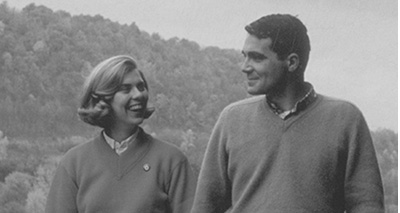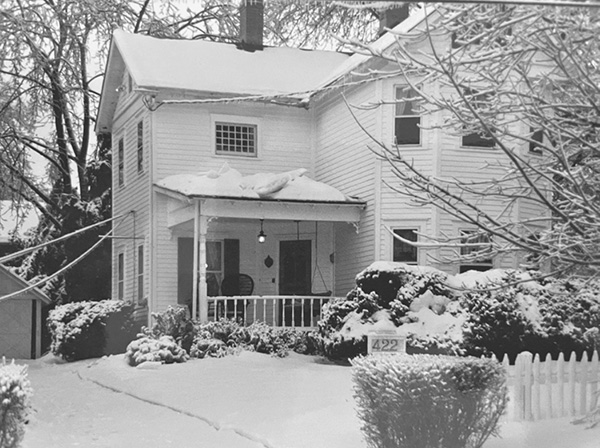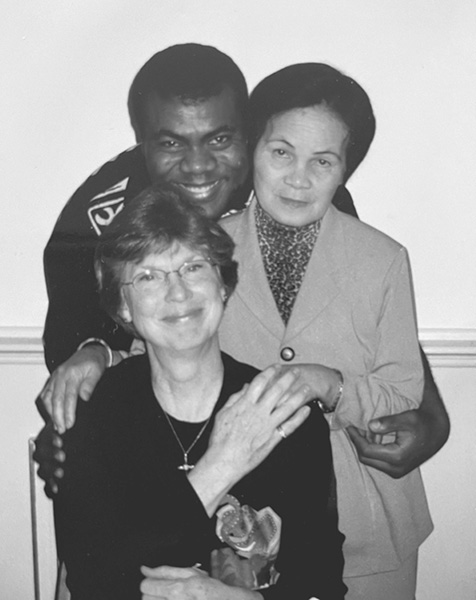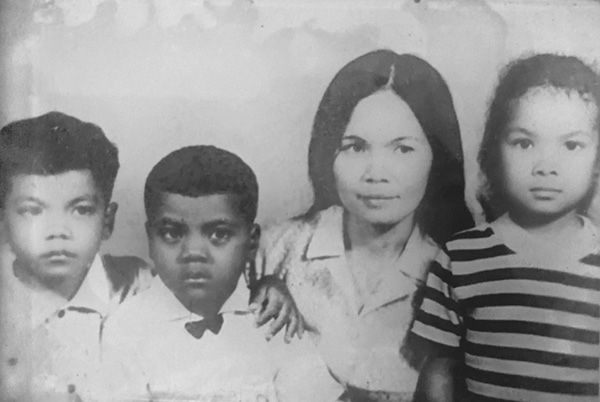The Ordeal of Sincere White Liberalism, Part II
Anastasia Katz, American Renaissance, February 2, 2024

Sheryl and Bob as newlyweds.
Subscribe to future audio versions of AmRen articles here.
Continued from Part I.
Altruism and strained resources
Caring for six children costs a lot of money. Bob had to sell land in New Hampshire, where he had hoped to build a vacation home. After Eddie was adopted, Matt had to move into the attic with him and Bear. They got to their new “bedroom” through a small stairway in the hall closet. The ceiling was so low, the boys had to crawl on their hands and knees. In summer, it was sweltering.

The Guterl’s house.
Matt’s winter coat that year was a hand-me-down from an older cousin, with patches and zippers that did not close properly. Matt’s school had a winter-coat drive, but he did not ask his mother to buy one for it. She would get something cheap, and he wanted the recipient to fit in with the fashionable children. After school, he went door-to-door and raised several hundred dollars to buy a name-brand ski jacket to donate. Matt’s mother found out, and made him return all the money, which was very embarrassing.
Sheryl scraped the money together and agreed to buy the fancy ski jacket; Matt chose a white one and left it in the donation bin, knowing he would never hear from the person who got it. All winter he kept an eye out for the coat, wishing to see a happy, smiling girl wearing it. He fantasized that if she saw him, she would instinctively know who gave her the coat, and would wave to him.
It took initiative to raise the money, but Sheryl made him return the money as though he had done something wrong.
Matt in high school and college
In high school, Matt heard the N-word more often, and thought white boys got a “thrill” from saying it. While hanging out and drinking, one friend said, “Your older brother is a Black but your younger brother is a n—–.”
The friend explained what he meant, but Matt was so uncomfortable that he didn’t listen. He came to believe that deep inside, whites “hate people of color. And it generally takes a couple of drinks . . . to get our tongues loose.”
Bob lectured his children at breakfast and dinner about racial differences in policing and sentencing, and gave all his children “the talk.” He was a judge who signed arrest warrants and worked with police, but he didn’t trust them. He told his children police are incredibly thin-skinned and prone to “ego-driven overreactions.” He told his children to “overperform respectful courtesy.” This was a regular topic, like overpopulation. Bob told them that if they annoyed a police officer, he would take it out on them.
In Matt’s small town, the police he knew were kind and polite. His father even invited them to dinner. Yet Matt was so afraid that he kept a criminal justice textbook on the back seat of his car, “just in case, as a sympathetic prop to ensure gentler treatment.” This was in addition to the special license plates on all the family cars, showing they were owned by a judge. One day, Matt attached an empty beer to the car as a hood ornament and drove by the police station to see if being white would help him get away with this infraction. Nothing happened. It reinforced Matt’s belief in white privilege.
Matt was a mediocre student, and his options for colleges were limited. His parents sent him to a school in West Virginia, which was “one of the whitest and most segregated places” he had ever seen. There was no discussion about race in any of his classes. He had no black professors. Matt writes that college was where he heard the N-word the most: “It is uttered with new relish by white students from the East coast, young men and women who have never dared to use it before and who are suddenly enthralled with it, excited to use it in the myriad all-white spaces that the university provides.”
Matt watched black fraternity pledges move around the campus in close formation, and interpreted this as “a necessary precaution in the largely segregated campus.” Black fraternities sometimes require pledges to walk around in single file and dress identically, as a bonding experience.
Matt cut class and got drunk a lot. He failed four classes and got a D in the fifth. He does not own up to leaving because he could not keep up. He says the college was “southern in all the wrong ways” and that he couldn’t return to “segregation.” He attended a local community college known to be for underachievers. Matt got close to a black professor, and told him about the gang of boys in New Hampshire who called him the N-word. The professor said, “You aren’t truly an American if you haven’t been chased through the streets with someone hollering the word n— at your back.”
“The incident”
Eddie, all-black and the youngest, stole things, and refused to be loved. As a teenager, he went on drinking binges and did break-ins that resulted in “police interventions.” Matt thought this would have been forgiven if Eddie had been white.
Bob and Sheryl couldn’t understand why Eddie was misbehaving, so they took him to a black psychologist, but Eddie did not improve. Bob had to put a lock on the liquor cabinet because Eddie would drink until he passed out. Eddie stole things from his parents and sold them. Then he began stealing things from neighbors, even their pets. Matt said this caused “alarm, or racial panic.”
When Eddie was struggling to get through high school, something happened that the family would thereafter refer to as “the incident.” Bug — fully Korean and the first child the Guterls adopted — was living at home attending Rutgers. Bug and Eddie were in the basement when a “minor dispute” turned violent. Matt said he arrived to find his father “cauterizing the wound,” but Matt is vague about what happened.
Eddie’s therapist had him admitted to an inpatient institution, but he was moved from one to another because he couldn’t behave. At a wilderness school for badly behaved teenagers, he stole a car and burned it. He ran away from another school and assaulted a cop. Bob later regretted that he had called the therapist; he thought that put Eddie on the road to jail. Matt writes:
The penal state intervenes. Reform schools give way to jails and then prisons and then penitentiaries. Escapes lead to other, more major offenses. The school-to-prison pipeline becomes for him, a one-way superhighway.
Matt calls “the incident” “our ending.” Bob had a non-fatal heart attack soon after, and two years later, his parents sold the house with the white picket fence. Eddie never lived at home again.
“The incident” led to Bug’s estrangement. One year, Bug did not show up for Thanksgiving. Bob went to his apartment, but Bug wouldn’t let him in or speak to him. Bob wrote a letter, saying he was worried about Bug being alone and isolated, and asked him to come for Christmas. Bug wrote back, saying he didn’t want to be pitied or rescued, and that he felt no gratitude. The letter left Matt crestfallen; Bug was treating them like strangers. It was a rejection of his idea of “us.” Bob tried once more, reminding Bug that his health was failing, but Bug never replied.
Matt and Bear stayed in touch with Eddie and supported him in prison. Eddie sometimes asked for books, so Matt sent books on race relations and Afrocentrism and designed a Black Studies curriculum for him. He sent novels that were “aching meditations on the cultural reach of colonialism and racism.” The books were supposed to explain why Eddie had so many problems but they didn’t interest him.
Matt sent The African Origin of Civilization because another inmate recommended it to Eddie. After reading it, Eddie asked if the ancient Egyptians were really black. Matt realized that Eddie just wanted “a straightforward confirmation” and said “yes,” though he now confesses that he didn’t believe it. When Eddie asked if “white people were barbarians,” Matt told him that at the height of Islamic civilization, medieval Europe was a “provincial backwater.”
Bear was reared Catholic but became Rastafarian. When he got married at home with his father officiating, the ceremony included “jumping the broom.” Bear’s half-brother Peter arrived “sporting a long beard and dressed in an elaborate red silk shirt with a priestly white stole and a white turban, honoring a new pan-African politics.”

Bear with his biological mother and adoptive mother.
Both Bear and Peter were raised by white families in America, but threw off white habits as soon as they were adults. Matt’s white biological brother Mark reappears in the book very briefly at Bear’s wedding where he gives a toast: “To my brother, who once rubbed my face in his armpit when I called him a ‘sweathog.’ ”
Bob’s death
When Bob died, the family had a small private funeral, but Bug did not come. Then they had a second funeral that was open to the public. They pulled strings to get Eddie a temporary release from jail, and the sheriff brought him to the funeral through a back entrance. Police told the family to stay away from Eddie, so they opened a door a few inches and watched through the crack, as two officers brought Eddie to the casket. Matt saw a teardrop tattoo on his cheek. He wanted to comfort his brother: “We are within ten feet of Eddie, but the entire racial state, with its regime of barbed wire and steel shackles, lies between us.”
People at the funeral told Matt that his father was “a saint.” Newspapers covered the funeral and the photos of Bob’s grown children gave the impression that “the experiment has been a success.” Bear was an engineer by then, and the white brother, Mark, became a teacher at an inner-city school in Newark, “the embodiment of liberalism’s best effort.” Bug attended the public wake and was detached through most of it, but he cried as they left for the burial.
A year after Bob’s death, at a family reunion, Anna said something in bad English, and when Matt corrected her, she called him a racist and went on a tirade, implying that there never was an us.
Eddie’s downward spiral
When Eddie got out of jail, Sheryl didn’t want him to move in with her, because he stole cash and blank checks. Instead, he lived with a girlfriend and their daughter. Sheryl and Matt took Eddie to a diner, where they told him they would help him get a job. They bought him clothes and gift cards for grocery stores. They got him a phone and paid the bills. Eddie told them he appreciated it. The result:
One day, Eddie simply stops responding to texts. His girlfriend tells us he is missing. Then, once more, he is back in jail. Visiting his daughter that week, we find the clothing we purchased on the ground outside the house, much of it still folded, and some of it still in the brown grocery bags we used to deliver it.
Eddie got out of prison and again asked Matt for money. Matt sent the money to Bear, who bought things for Eddie rather than give him money. He sent monthly remittances, but Bear eventually called Matt and said Eddie was back in jail because he “stole from the wrong people.”
When Eddie got back out, he tried to kill himself by walking into traffic, but he survived with serious injuries.
The hate crime
Bear told Matt that he had experienced racism only “in its most abstract, ‘indirect’ manifestations,” but as Matt was finishing this book, Bear was “assaulted by two young racists.”
He was driving to work, and at a traffic light, two white men jumped out of their pickup truck and taunted him, saying they would “kick his ass.” Bear drove away, but they followed him for three miles, shouting at him at each traffic light, telling him to get out of the car. Bear’s job was across the street from a police station, so he parked, thinking the police cars would scare the men off. He did not call 911. The two men parked behind him and got out of their car. Bear was watching them in his rearview mirror, and he accidentally put his car in neutral while trying to park, and the car rolled back into their pickup truck. Bear told his brother that the tattooed young men shouted, “Let’s get that n—-!”
One had a baseball bat and the other had a screwdriver. The one with the bat hit Bear in the head. Bear wrestled the bat away, and the two white guys ran back to their truck and drove off. Bear went into the police station to make a report, handing the bat over to the police. The cops told him, “This stuff is happening everywhere.”
Bear called Matt from the hospital, saying he was waiting for a CT scan, which came back negative. Matt said his brother was “mostly unharmed.” He urged Bear to go public with the story, so the police would prioritize his case, but Bear refused, thinking it would make him a target for other racists.
Bear blamed Donald Trump for the assault, saying, “These people used to live in the shadows and Trump gave them permission to come out. And now they are here with us and they aren’t going back into the dark without a fight.”
Matt marries a black woman but, surprisingly, writes nothing about the courtship. Perhaps we are to assume that miscegenation is so unremarkable it doesn’t have to be explained. By the time Mr. Trump was elected in 2016, Matt had a mulatto daughter. She asked if Uncle Bear would be deported. His black wife asked him if he would have married her if he hadn’t grown up in his family. He dutifully answered, “Of course.”
His wife has no illusions: “I don’t think you would have married me. I wouldn’t have married you. You would be different. I would have steered clear of you.”
The destruction of whiteness
Bob and Sheryl planned their family at a time when there were few white babies for adoption. They had good intentions; they believed they were stopping an overpopulation crisis and helping needy children. Their son never criticized his parents’ decisions to adopt, although he recognizes that they were naïve to think they could change society by what they did. In the end, Anna was calling Matt a racist.
The adoptions had a huge impact on Matt. The close relationship with Bear sounds positive, but I wonder if Matt’s goofing off in high school and college were a way to get attention from his parents. With Bear good at both academics and sports, could Matt have been carving out his own identity as a family troublemaker? If his biological brother Mark had been his only sibling, might he have avoided this rebellion? Did Matt flunk out of college in West Virginia on purpose because he wasn’t comfortable around whites, and the black fraternities wouldn’t have him?
The family split along racial lines after “the incident.” Matt stayed close to the two blacks, but the two Asians cooled to him. Did Bob and Matt favor Bear and Eddie because they thought blacks needed special attention? The author covers up for Eddie by describing “the incident” vaguely, and no one seems to care much about Bug, the victim. After Bug cut off contact, Matt never tried to reach him or ask to hear his side of “the incident.”
Matt frets about how blackness is perceived, without realizing that his family looked down on whites. It was considered “wasteful” to have another biological white child, but rearing children of strangers was productive. Bob and Sheryl were worried about “overpopulation” but never criticized Miss Thung for having three children she couldn’t support.

Miss Thung with Peter, Bear, and Amy.
Bob and Sheryl’s decision to adopt non-white children robbed their biological son of a healthy identity as a white man. He became alienated from his own race. “Growing up in this family has made me comfortable beyond measure in non-white spaces, and anxious in those spaces where there is only pale skin.” Presumably, that’s why he had to marry a black woman.
Did Matt’s understanding of race change as he grew up? He still seems to think all of Eddie’s problems were caused by a racism and that Bear is in constant danger from whites who might kill him. If anything has changed, it may be only that his Gen-X dream of a “colorblind” society has been shattered, and he now takes the progressive view that we must see color — and always in ways that paint whites as the bad guys.
Earlier in the book he writes what could be its conclusion:
As children in a family meant to undo racism, we were asked to learn — and to unlearn — race. To see one another as siblings — to see beyond our skin — but also, dissonantly, to see one another as color-coded, as representatives of different histories and different potentialities.
Those parallel lessons are, in the end, impossible to suture together . . . .















